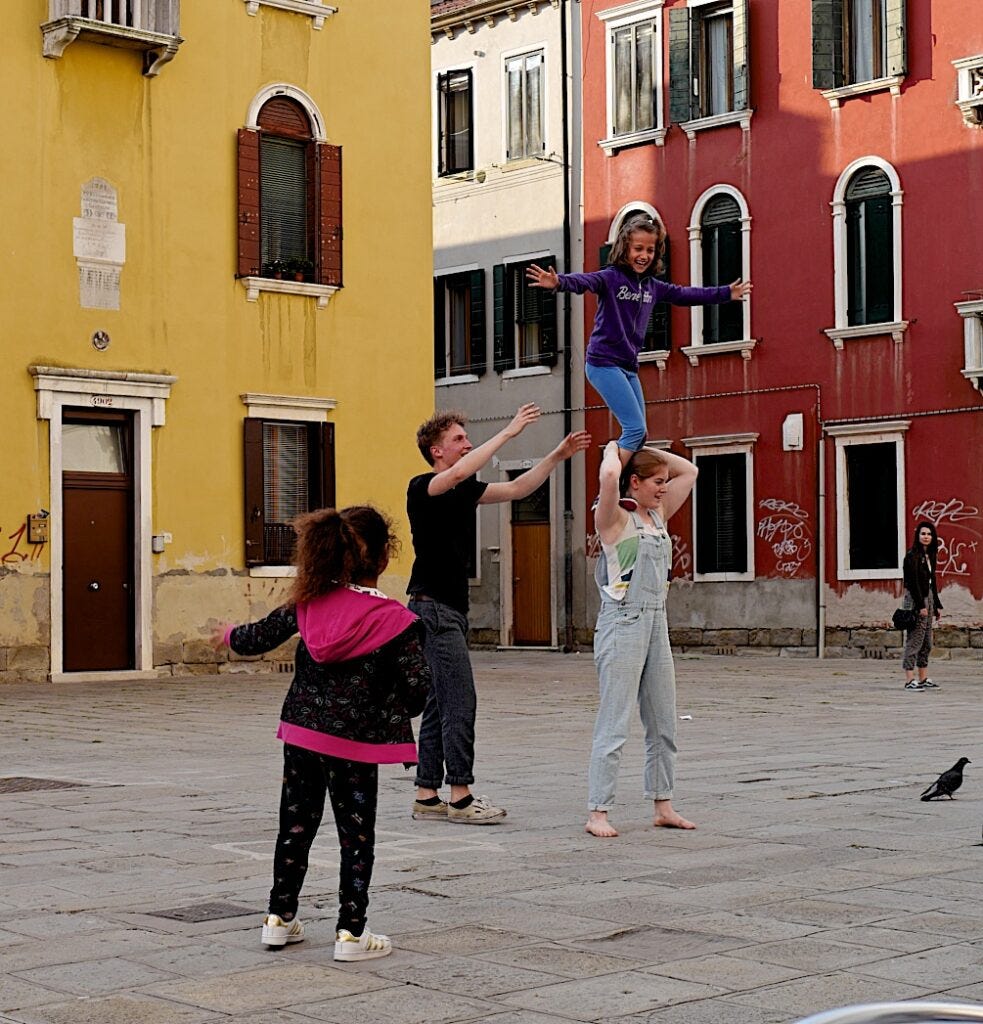Look! No hands!
This is one of my favourite pictures. On a visit to Venice some years ago my wife and I were sitting outside a cafe when a young couple of acrobats arrived and started to perform. They were watched not just by us but by a fascinated group of local children who had hitherto been playing football. Eventually, the two performers invited the kids to join them. What followed was absolutely entrancing. This is one of the moments that has always stuck in my memory. A kind of ‘decisive moment’ (with apologies to HCB)
Quote of the Day
”It was almost impossible to believe that he was anything but a down-at-heel actor resting between engagements at the decrepit theatres of provincial towns.”
Bernard Levin on Harold Macmillan
Musical alternative to the morning’s radio news
Liam O’Flynn | The Gold Ring | with Sean Keane on guitar
Long Read of the Day
Can “Distraction-Free” Devices Change the Way We Write?
Entertaining New Yorker piece by Julian Luca on how digital technology enabled productivity but invited procrastination. Which is why writers, he says, are rebelling against their word processors.
(Full disclosure: I gave up writing in Microsoft Word many years ago. Of course stuff I write sometimes appears in Word format because the recipient can’t handle anything else. But the words are always generated as plain text in Ulysses or similar writing tools which can output the text in a range of proprietary formats.)
Luca’s piece chronicles a journey through this compositional jungle. If you’ve ever tangled with word-processing software then maybe you’ll enjoy the ride. Certainly I did.
The Economist’s country of the year…
…is Italy. How come?
In Mario Draghi, it acquired a competent, internationally respected prime minister. For once, a broad majority of its politicians buried their differences to back a programme of thoroughgoing reform that should mean Italy gets the funds to which it is entitled under the eu’s post-pandemic recovery plan. Italy’s covid vaccination rate is among the highest in Europe. And after a difficult 2020, its economy is recovering more speedily than those of France or Germany. There is a danger that this unaccustomed burst of sensible governance could be reversed. Mr Draghi wants to be president, a more ceremonial job, and may be succeeded by a less competent prime minister. But it is hard to deny that the Italy of today is a better place than it was in December 2020. For that, it is our country of the year. Auguroni!
The Economist just loves technocrats.
What parking tickets teach us about corruption
Lovely column by Tim Harford.
Corruption is a function of many things: political incentives, formal legal institutions and culture. One of my favourite studies, by the economists Raymond Fisman and Edward Miguel, teased apart these different factors by examining the behaviour of diplomats in New York City. With most consulates located near the UN building in midtown Manhattan, diplomats lived a daily parking nightmare. Or at least they did if they felt any obligation to pay parking fines — but diplomats faced no legal consequences for ignoring those fines. Since all diplomats faced similar incentives, any difference in behaviour was most plausibly explained by a difference in cultural attitudes to breaking the rules.
Fisman and Miguel studied parking violations between 1997 and 2002, finding a strong correlation between unpaid tickets and more general perceptions of corruption. The worst offenders were Kuwait, Egypt, Chad, Sudan and Bulgaria. One Kuwaiti diplomat managed to accumulate two unpaid parking fines every working day for a year.
In contrast, the entire consulates of Denmark, Norway and Sweden did not pick up a single unpaid parking ticket — not one — in the entire six-year period. Given the temptations, that is impressive.
But no less impressive were the British diplomats. They, too, accumulated no unpaid fines. So we must not despair. The recent outcry suggests that there is still a price to be paid for breaking the rules, or for trying to rewrite them when convenient. And the evidence from New York is that British civil servants are beyond reproach.
But… here’s the nub of Britain’s current problem…
A certain Boris Johnson once worked as GQ magazine’s motoring correspondent. His editor noted that Johnson had cost GQ “£5,000 in parking tickets”, but he wouldn’t have him any other way.
Well, well. And — as Harford observes, if Johnson faced no consequences then, why would he expect consequences now?
Xmas Books – 1
I like giving books as presents, but have a rule: never give a book that you yourself would not want to get. So for the next few days I want to highlight books I’ve read this year that meet that criterion.
This is the most extraordinary book I’ve read this year. It’s a vivid account of what it’s like to grow up in a totalitarian state (in this case Albania under the dictatorship of Enver Hoxha) and then to experience an abrupt transition to so-called liberal democracy, with all the ambivalences that implies. Among other things it makes one understand why the European states formerly within the Soviet empire have had such trouble evolving into functioning democracies.
If you want some background before embarking on it then this conversation between the author and my colleague David Runciman would be a good place to start.





